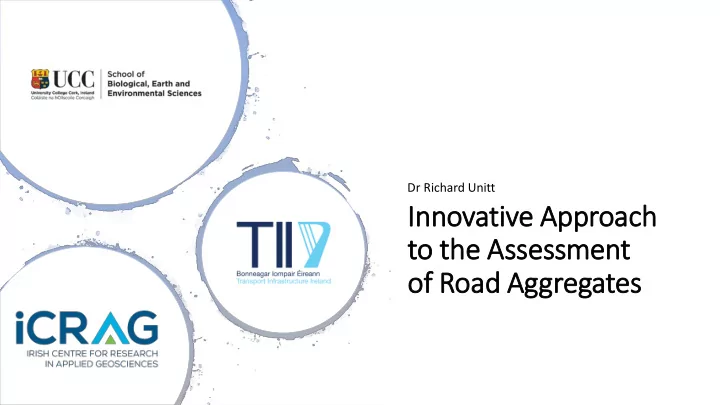

Dr Richard Unitt In Innovative Ap Approach to o th the As Assessment of of Roa oad Agg Aggregates
Petrographic and Metrological Analysis • Follow the product from quarry to laboratory to end-use in road surface course. • Measure microtexture (roughness) of aggregate particles • Examine, microscopically, the mechanisms that cause aggregate particles to wear and weather. • Develop ‘fingerprints’ to ensure traceability of aggregates.
Providing reliable quantitative measurement of microtexture • 2D profiles of aggregate chippings not enough • 3D areal surface texture • Roughness (ISO 25178) • Digital Microscope • Leica Map Software
Focus Stacking – Z- stacking
S q - Root mean square height of the scale- limited surface 1 𝐵 𝑨 2 𝑦, 𝑧 d𝑦d𝑧 = Roughness • 𝑇 𝑟 = 𝐵 • Measurement in microns (µm) • Can be measured from: • freshly crushed aggregate • aggregate artificially polished in the laboratory • aggregate in road-core
Road Core HRA + PCC PMSMA
Roughness Measurement • Aggregate particles mapped for each core ‘cap’ • Visible petrography using a stereomicroscope – grain-size, colour, identifiable minerals • Transferred to digital microscope • Each particle measured in a specified field-of-view • Large topographical differences (concave/convex) removed • Remaining height variation = roughness
Experimental Work
Major Factors Controlling Aggregate Microtexture (Roughness) and Durability • Grain-size • Mineralogy • Main minerals present • Distribution of ‘matrix’ • Micro-structure • Induration/fluid infiltration • Degree of weathering
Quarry Face Mapping
Lithology
Structure + Fluid Infiltration 0.5m
Hand Samples and Thin Sections
Raman Spectroscopy • Raman Spectroscopy – expose mineral to a light source of specific wavelength (laser). The light interacts with molecular vibrations causing a shift in the energy of the laser photons and is recorded as a spectra. • Generate mineral maps of thin sections and aggregate particles
Equipment • Map rough, uneven, and curved surfaces • Little or no sample preparation is required • View Raman chemical images in 3D and see both the chemistry and the topography
Raman Mapping
Understanding Mineralogy and Grain Relationships
3D Imaging
Laser Generated Topographic Maps Provide detailed information on the microtexture (roughness)
Research Output • Generate database of aggregates utilised in Ireland • Quarry samples • APM shoes • Road Core • Develop model for ranking aggregates based on their petrography • Ability to maintain required roughness (microtexture) over predicted lifetime of surface • Durability – under load, chemical stability, resistance to freeze/thaw
Recommend
More recommend